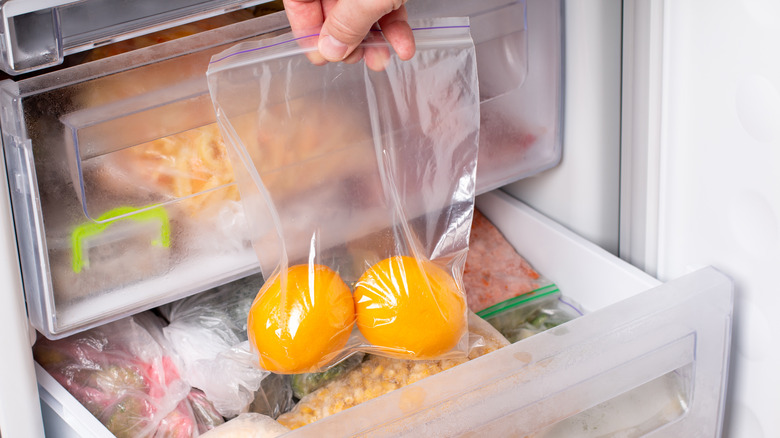Should You Store Whole Lemons In The Freezer?
Finding you have more lemons than you can use in one go is not surprising. This citrus fruit is a beloved ingredient used in several dishes, so it makes sense to buy it in bulk to stock up for future meals while taking advantage of built-in discounts. Plus, when the produce is in season, the thought of enjoying it at its freshest and tastiest state just pushes you to load your cart with more bags. But once you arrive home, the big question is how do you store the dozens of lemons? Should you store them whole in the freezer? Well, it depends, because there are pros and cons of using this preservation method.
One of the benefits of keeping lemons in the freezer is the extended shelf life. If you leave them on the countertop at room temperature they'll last about a week at most. Stash them in the fridge and after about one month, you'll find yourself with sad-looking, dried-out lemons in the crisper drawer. Conversely, freezing allows lemons to stay fresh for up to three to four months. This way you also reduce food waste as you hardly need to throw out any spoilt citrus. But beyond the long shelf life, freezing whole lemons offers convenience and nutritional benefits.
The convenience and nutritional benefits of frozen whole lemons
Once a lemon is frozen, zesting and juicing because hassle-free. For one, grating the skin of the solid fruit is easier than scraping at the usual soft-textured unfrozen version. Additionally, once you defrost the lemon, juicing it is a breeze because the pulp softens up. When you squeeze it creates less resistance and hence produces significantly more juice than with any other method.
But using frozen whole lemons doesn't always have to involve zesting and then juicing. In fact, the easiest way to enjoy the frozen citrus is to grate all of it. Once the lemon is frozen solid, take a grater and pulverize everything – from the peel and pith to the pulp, and even the seeds (if any). You don't have to worry about a bitter taste from the rind because freezing mellows out the flavor. You'll end up with what looks like lemon snow which you can transfer into ice cube trays, store in the freezer, and use later to sprinkle on top of salads, soups, sauces, and juices.
This grated frozen whole lemon not only adds a delightfully fresh citrusy flavor to dishes but also comes chock-full of nutrients. You see, the rind contains more nutrients than the lemon juice, so by grating all of them together, you get to experience the full nutritional benefits of this produce in every dish you add it to: From vitamins and minerals to fiber, essential oils, and even proteins.
Freezing whole lemons isn't without its drawbacks
Although taste perception varies from person to person, most eaters agree that frozen lemons have a slightly different taste from their fresh counterparts. This can be disadvantageous since your lemonade or lemon-infused water may end up tasting a bit off. However, you can still use the frozen lemon for cooking and baking. Another issue with freezing whole lemons is the fruit turning mushy after thawing which limits its uses: You'll need to avoid adding it to dishes that require the lemon to look pretty and well put together e.g. garnishing drinks.
If you can't deal with these drawbacks, the other option is to first process your lemon into different parts and freeze each one separately. For example, grate the fresh lemon and freeze the zest, or squeeze out the lemon juice and freeze it in ice cube trays. Alternatively, just forgo the freezing and keep the lemons in a refrigerator set to the correct temperature, but use them before they get old.
So, with all that said, should you store whole lemons in the freezer? It all depends on what you want to use the lemon for. If you're mainly interested in the juice and don't mind a change in texture, freezing could be a practical solution. But if you need the lemons to look and taste like they just came off the tree, it might be better to keep them in the fridge and use them up before they start to lose their freshness.


